by Ken Sehested
It started as a typical evening’s research, selecting and reading a number of news stories in search of material for my weekly column. One on the list was the account of San Francisco 49ers’ quarterback Colin Kaepernick sitting during the playing of the national anthem prior to the start of the game.
Reading these accounts led me to similar events in previous years of athletes using their public visibility as a stage for protest. That led to digging into the history of the national anthem, “The Star Spangled Banner,” including its largely unknown third verse which celebrates the killing of African slaves. This information led me to research the US invasions of Canada (also largely unknown here).
It was a busy evening, but a fascinating one.
And these questions revive an ancient debate, for people of faith, over competing claims over what is or is not sacred.
§ § §
Kaepernick had not publicly announced his decision; in fact, he had remained seated in the three previous preseason games, but no one noticed. This time, a reporter spotted him.
Now both commercial and social media are ablaze with a debate over his sit-down, a dispute that adds extra decibels to our electoral cacophony and another chapter in our anguished national debate on race. Over and over his mortal sin is named as a “lack of pride” in his country.
Responding to reporters’ questions, Kaepernick said, “Ultimately it’s to bring awareness and make people realize what’s really going on in this country. There are a lot of things that are going on that are unjust, people aren’t being held accountable for, and that’s something that needs to change. That’s something that — this country stands for freedom, liberty, justice for all. And it’s not happening for all right now.”
That statement is surprisingly similar to one made by legendary baseball great Jackie Robinson, who wrote in his 1972 biography, “As I write this twenty years later, I cannot stand and sing the anthem. I cannot salute the flag.”[1]
§ § §
Freedom, in its current usage, has come to mean dominion.
§ § §
Ann Killion, sports writer for the San Francisco Chronicle, recently questioned the purpose of singing the national anthem “At an event that is a game between two arms of a giant corporate entity. What is so patriotic about spending $300 a ticket to watch big guys hit each other?”[2]
It wasn’t until 1931 that “The Star-Spangled Banner” became our national anthem, and then only after 40 previous congressional votes, beginning in 1918. The song was not universally beloved, partly because of its difficulty in singing, and partly because of obscure lyrics. Among the obscure ones is a phrase in the third stanza’s:
“No refuge could save the hireling and slave / From the terror of flight or the gloom of the grave.” The reference was to mercenary forces employed by the British in the War of 1812, along with American slaves who volunteered to fight in exchange for Britain’s pledge of their freedom.
In a Facebook post my friend Ray made another historical reference, summarizing many of the Kaepernick criticisms he has heard:
“Your refusal to stand betrays a tremendous disrespect and will not accomplish anything. Almost everyone else has always stood up, so why won't you? Why don't you just make things easier on yourself and just stand up. If not, you should be put out of a job, or better yet, put in jail.”
Ray then added his own conclusion: “These are all comments once directed to Rosa Parks at a different time and place, but perhaps some things aren't that different after all.”
§ § §
War is always a dispute over bread and the land needed for its production. But, given the reach of modern economic institutions, land needs not be owned in order to be controlled.
§ § §
The tune for which Frances Scott Key wrote his poem—originally titled “Defence of Fort McHenry”—was a well-known English ballad celebrating the virtues of boozing and womanizing. Better that, though, than adopting the tune of Britain’s national hymn, “God Save the Queen,” for use in our own—as in “God Bless America,” one of the early candidates for a national anthem, which copies the Brit’s note-for-note.
In 1861, poet Oliver Wendell Holmes wrote a fifth verse to support the Union cause in the Civil War and denounce “the traitor that dares to defile the flag of her stars.”[3] I doubt this verse will be sung this Saturday at the Auburn-Clemson game.[4]
§ § §
When gold medal gymnast Gabby Douglas did not place a hand over her heart for the singing of the U.S. National Anthem during the 2016 Rio Olympics, she was heavily criticized to the point where she released a public apology. Meanwhile, white shot-putters Ryan Crouser and Joe Kovacs kept their hands down at their side and no one questioned them.[5]
§ § §
My own congregation has a history regarding alleged desecration of national honor. Several years ago a couple of our youth, on their own accord, refused to stand, salute the American flag and say the Pledge of Allegiance at the start of their school day. I’d like to think the roots of this resistance were planted, or at least nourished, in our community, in our songs and Sunday school lessons and sermons about the never-ending competition for spiritual allegiance. “For you shall worship no other god, because the LORD, whose name is Jealous, is a jealous God” (Exodus 34:14).
§ § §
It never occurred to me before now to ask what exactly a “spangle” is (as in “star-spangled”). The dictionary says it’s “a small thin piece of glittering material typically used to ornament a dress; a sequin.” A shiny plastic thing. Now I can’t get the image of the flag as a star-sequined banner out of my head.
§ § §
Many historical accounts refer to the War of 1812 as “America’s Second War of Independence.” More properly, it was America's “First War of Choice,” since it was we who declared the war. Though historical causation is always a complicated matter, and both Britain and the U.S. had lingering disputes from our previous war, the evidence is clear that the war’s principal aim was annexation of Canada.
Among the many pieces of our forgotten history is the fact that the U.S. invaded Canada four times: in 1775 during the Revolutionary War; in the War of 1812; in 1837-‘38 in the Patriot War and the Battle of Windmill; and in the Fenian raids of 1866-’71.[6]
Then there was the near war, “The Pig War” (literally, over the killing of one pig), when in 1859 US and British troops and warships amassed around the San Juan Islands near Seattle.[7] Thankfully, cooler heads prevailed.
Finally, it wasn’t until 1939 that the U.S. formally abandoned an invasion plan known as “War Plan Red,” developed in the 1920s, as a contingency should we again go to war with Britain. (As it turns out, the Canadians has a similar plan for us.)
§ § §
“There is no flag large enough to cover the shame of killing innocent people.” —Howard Zinn
§ § §
The U.S. Civil Code[8] that regulates the display of the flag stipulates that whenever other flags are also displayed, the American flag always takes precedence—meaning, no other flag above it; or, if on the same level, the U.S. flag must always be on its own right (the viewers’ left).
A church in our neighborhood got in trouble over this not long ago, hoisting the Christian flag above the American flag on its front lawn pole. After a brief rash of indignant comments, and a surprisingly old fashioned Baptist defense from the pastor, the publicity faded. Federal law does not prescribe a penalty for such desecration.
In fact, the earliest “flag desecration” laws (every state had one by 1932) were not enacted to squelch political dissent but to prohibit use of the flag for political or commercial ends—something that now happens all the time. The only attempt at federal law criminalizing flag desecration (in 1968, specifically aimed at repressing flag burning) was overturned by the Supreme Court in 1989.
§ § §
“There are no unsacred places; / there are only sacred places / and desecrated places.” —Wendell Berry, “How to Be a Poet”
§ § §
The U.S. flag was only occasionally used or displayed, except on naval vessels and installations, until the Civil War when it became the winning side’s banner for the largest slaughter in U.S. military history. The anthem, which centers the flag in national memory, came to its cultural fore in 1918 during the opening World Series game pitting the Chicago Cubs and the Boston Red Sox. It was received so well, during the seventh inning stretch, that when the series moved to Boston, the Red Sox owner hired a band to do the same.[9]
The flag being raised over the grisly battle hilltop of Iwo Jima in World War II is among our national icons. Prior to 9/11, most stations switched to a commercial during the obligatory playing of the national anthem prior to sporting events. “The anthem means a lot more today,” said Ed Goren, president of Fox Sports[10]—whose only job, like all such executives, is to make money for shareholders.
Now the flag-centered anthem is broadcast at every major sporting event in the U.S., including NASCAR races and even a few “professional” wrestling matches. Whole companies exist to manufacture red-white-and-blue apparel: headscarves, bikinis, whole wardrobes; and car dealers frequently boast the biggest flags in town.
§ § §
The flag's central purpose, aided by the anthem, is to maintain attention to, and confidence in, military supremacy. The nation's memory of flag "desecration" is associated with the shame of the one war—Vietnam—we lost.
§ § §
The thing about desecrating the flag is that it first must be considered sacred. The thing about pledges of allegiance, hands over hearts, are the covenant terms. Maybe it’s not so serious. The courts have ruled that “In God We Trust” is devoid of actual religious content but serves as a form of “ceremonial deism.”[11] As Oliver Wendell Holmes wrote, “Most people are willing to take the Sermon on the Mount as a flag to sail under, but few will use it as a rudder by which to steer.”
To make sacred is to sanctify. To sanctify is to make righteous. To make righteous is to restore right-relatedness, “on earth as it is in heaven.” Sacred duty means the well-being of the community transcends all else, even one’s own life. Which is why the moral tone of a soldier’s vow is so impressive.
The contest of allegiance, as to which flag takes precedence, has grown murky. The Constantinian assumption remains secure, with the state’s purpose assumed to be largely parallel to that of the church. So, typically, we put both flags in our sanctuaries without second thought, usually with the arrangement of honor stipulated in federal law. The dispute over sovereignty, over whose bread will satisfy, over whose power is more reliable, over whether love is stronger than fear, is adjudicated anew every time we come to the Table. Unfortunately, the bread tends to be stale.
Kaepernick’s pride, or lack of it, brings to mind this ancient assessment. “Look at the proud! . . . They open their throats wide as Sheol; like Death they never have enough. They gather all the nations for themselves, and collect all peoples as their own” (Habakkuk 2:4, 5).
§ § §
“You don’t like what Kaepernick has to say? Then prove him wrong, BE the nation he can respect. It’s really just that simple.” —Navy veteran Jim Wright [12]
# # #
NOTES
[1] http://mlb.nbcsports.com/2016/08/29/jackie-robinson-i-cannot-stand-and-sing-the-anthem-i-cannot-salute-the-flag/
[2] http://www.sfchronicle.com/49ers/article/Is-the-national-anthem-even-necessary-9191779.php
[3] Christopher Klein, “9 Things You May Not Know About The Star-Spangled Banner”, History.com http://www.history.com/news/9-things-you-may-not-know-about-the-star-spangled-banner
[4] In case you’re interested, there are official protocols to be followed when the national anthem is played. https://www.law.cornell.edu/uscode/text/36/301 Also, Time magazine has assembled videos of what it judges the “Top 10 Worst National Anthem Renditions.” http://content.time.com/time/specials/packages/article/0,28804,1889754_1889752_1889689,00.html
[5] Morgan Jerkins, “What Kolin Kaepernick’s National Anthem Protest Tells Us About America,” Rolling Stone http://www.rollingstone.com/sports/colin-kaepernicks-national-anthem-protest-w436704
[6] https://en.wikipedia.org/wiki/Invasion_of_Canada
[7] Larry Getlen, “The Secret Canadian plan to invade the US,” New York Post http://nypost.com/2015/05/24/the-secret-canadian-plan-to-invade-the-us/
[8] https://www.law.cornell.edu/uscode/text/4/7
[9] For more see “A brief history of ‘The Star-Spangled Banner’ being played at games and getting no respect,” Fred Barbash and Travis M. Andrews, The Washington Post https://www.washingtonpost.com/news/morning-mix/wp/2016/08/30/a-brief-history-of-the-star-spangled-banner-being-played-at-games-and-getting-no-respect/
[10] http://articles.chicagotribune.com/2001-09-21/sports/0109210225_1_anthem-sports-broadcasts-fox-sports
[11] https://en.wikipedia.org/wiki/Ceremonial_deism
[12] http://americannewsx.com/hot-off-the-press/vets-respect-compelled-bought-inherited/
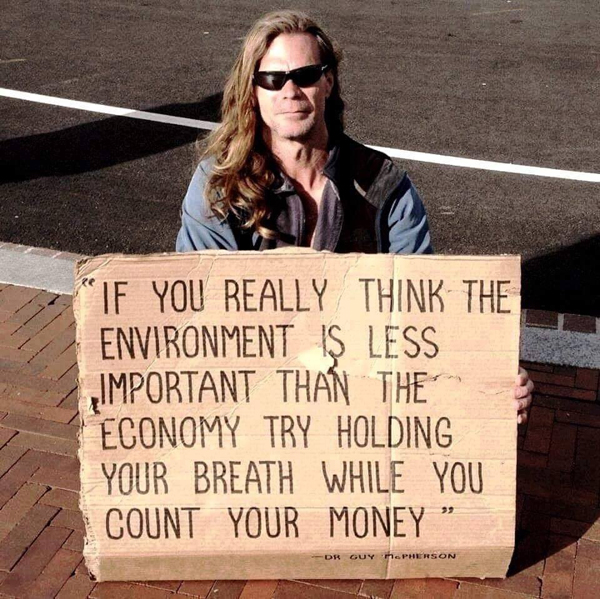 celebrating—even when you recognize that we’re still in deep doo-doo with regard to our climate crisis.
celebrating—even when you recognize that we’re still in deep doo-doo with regard to our climate crisis.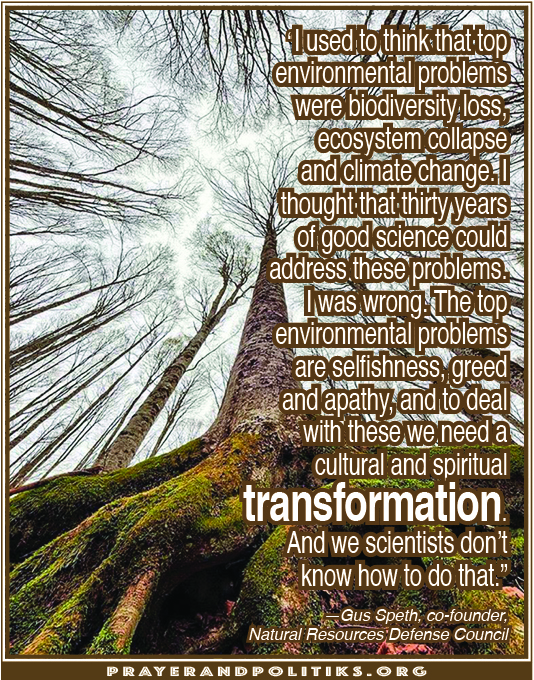 corporations in recent months. —Andy Rowell, “Fossil fuel companies getting more U.S. bailouts than any other sector,” Oil Change International
corporations in recent months. —Andy Rowell, “Fossil fuel companies getting more U.S. bailouts than any other sector,” Oil Change International 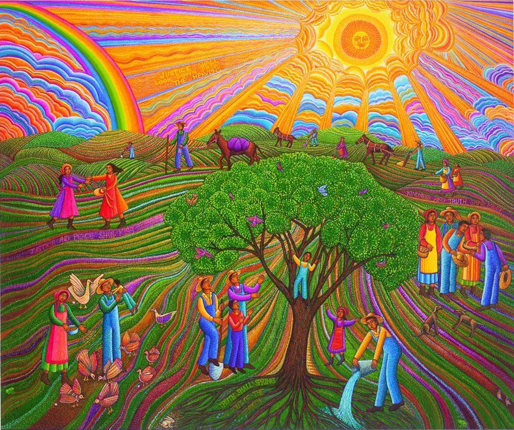 of people, of all nationalities and political affiliations, would risk life and limb to forestall destruction. Is it possible to bring that magnitude of resolve and urgency to bear on our very real predicament?
of people, of all nationalities and political affiliations, would risk life and limb to forestall destruction. Is it possible to bring that magnitude of resolve and urgency to bear on our very real predicament?

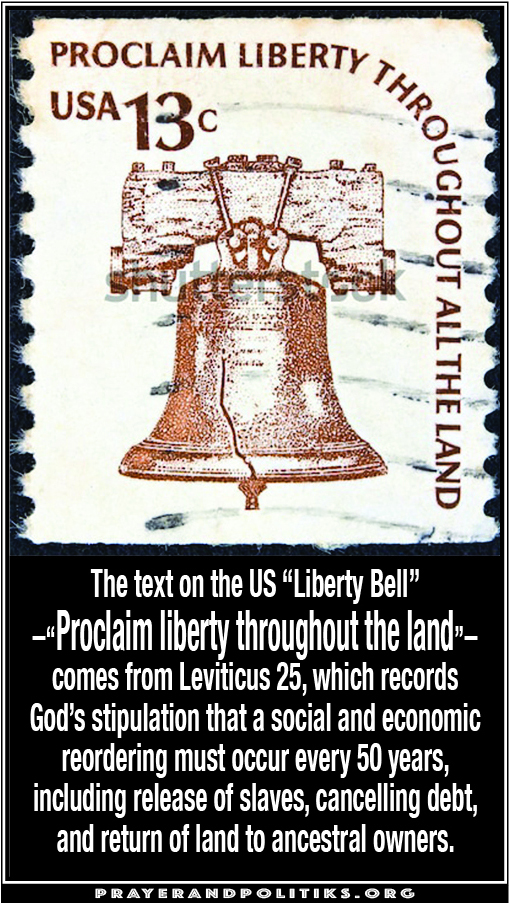 covenant with the Hebrew people, requiring the forgiveness of debt, reclamation of ancestral lands and the release of slaves every 50 years.
covenant with the Hebrew people, requiring the forgiveness of debt, reclamation of ancestral lands and the release of slaves every 50 years.
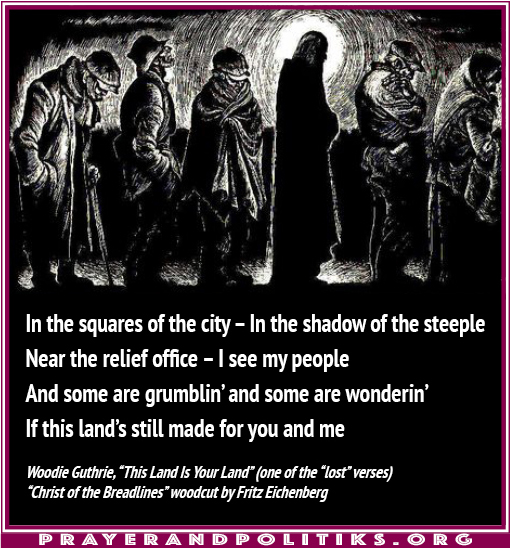 In the squares of the city – In the shadow of the steeple
In the squares of the city – In the shadow of the steeple the word “bless” is used in the Newer Testament, only twice is it an imperative—and neither involve God: In Jesus’ instruction to his listeners, “Bless those who curse you” (Luke 6:28) and Paul’s echo of the same: “Bless those who persecute you, bless and do not curse” (Romans 12:14). [1] In his upside-down kingdom dream, Jesus’ intention for blessing was not to sacralize violence but to draw enemies within Mercy’s reach.
the word “bless” is used in the Newer Testament, only twice is it an imperative—and neither involve God: In Jesus’ instruction to his listeners, “Bless those who curse you” (Luke 6:28) and Paul’s echo of the same: “Bless those who persecute you, bless and do not curse” (Romans 12:14). [1] In his upside-down kingdom dream, Jesus’ intention for blessing was not to sacralize violence but to draw enemies within Mercy’s reach.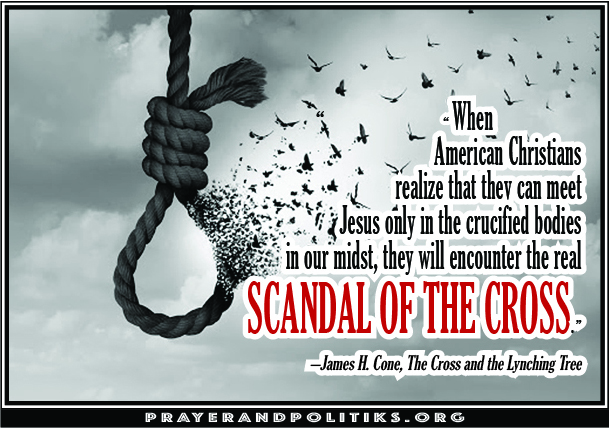 imperial designs, who claim authority to divide the world into makers and takers, to shape all reality in service to the ruthless pursuit of power’s conceit, arrogance being the elixir of indefinite, everlasting rule of the strong over the weak, the privileged over the disdained, the worthy over the maimed.
imperial designs, who claim authority to divide the world into makers and takers, to shape all reality in service to the ruthless pursuit of power’s conceit, arrogance being the elixir of indefinite, everlasting rule of the strong over the weak, the privileged over the disdained, the worthy over the maimed. truth, “altruism is incompatible with freedom, with capitalism,” and with “the pursuit of happiness.” (Novelist-philosopher Ayn Rand, a favorite of banksters and gangsters alike, from her essay, “The Virtue of Selfishness.”)
truth, “altruism is incompatible with freedom, with capitalism,” and with “the pursuit of happiness.” (Novelist-philosopher Ayn Rand, a favorite of banksters and gangsters alike, from her essay, “The Virtue of Selfishness.”)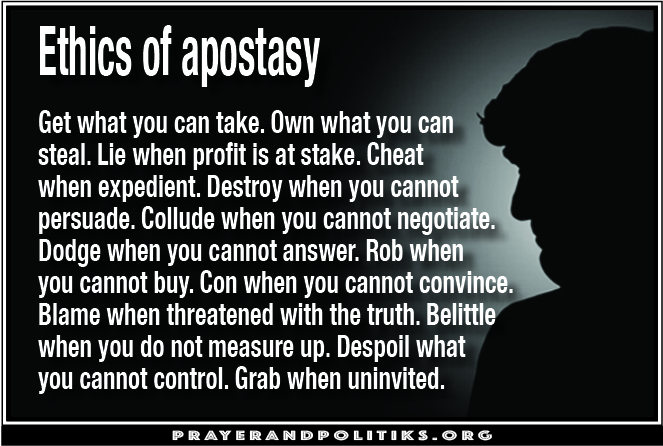 spur, stir, encourage—“to love and good works” (Hebrews 10:24), to fulfilling the demands of justice, the prerequisites of peace, all of which are mediated by the imperative of mercy.
spur, stir, encourage—“to love and good works” (Hebrews 10:24), to fulfilling the demands of justice, the prerequisites of peace, all of which are mediated by the imperative of mercy.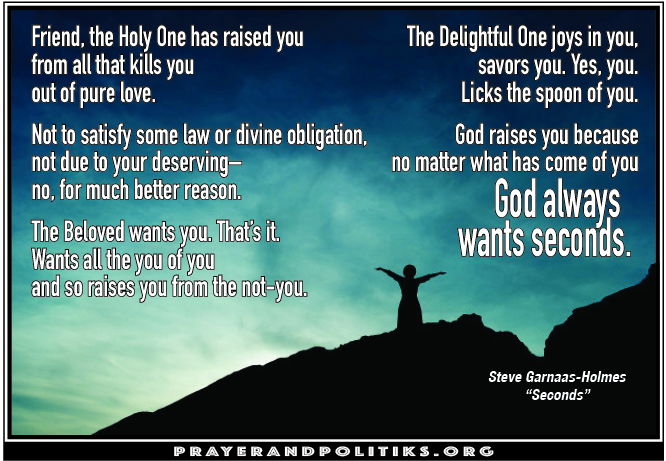 through the valley of the shadow of death. “For thine is the kingdom” begins the closing affirmation of Jesus’ model prayer. Just before that, though, is the petition “deliver us from evil.”
through the valley of the shadow of death. “For thine is the kingdom” begins the closing affirmation of Jesus’ model prayer. Just before that, though, is the petition “deliver us from evil.”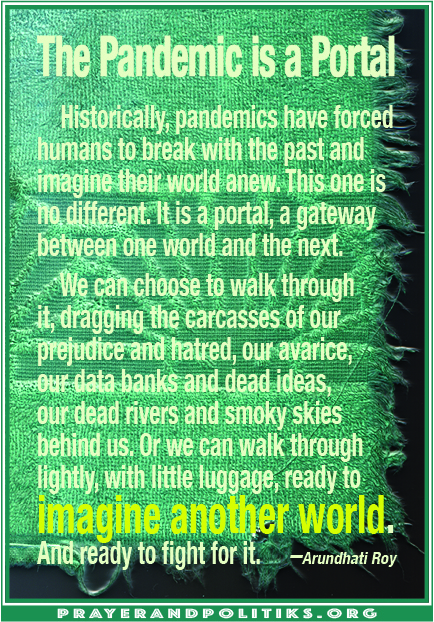 blessing on Earth’s creation has been suppressed but not recanted.
blessing on Earth’s creation has been suppressed but not recanted.
 Late last night I sat in stunned silence, agonized in heart, fearful in soul, body limp, watching the fiery conflagration in Minnesota. I instinctively wanted to be surrounded by a corps of wailing women from traditional cultures. I wanted to unsee what I was seeing.
Late last night I sat in stunned silence, agonized in heart, fearful in soul, body limp, watching the fiery conflagration in Minnesota. I instinctively wanted to be surrounded by a corps of wailing women from traditional cultures. I wanted to unsee what I was seeing.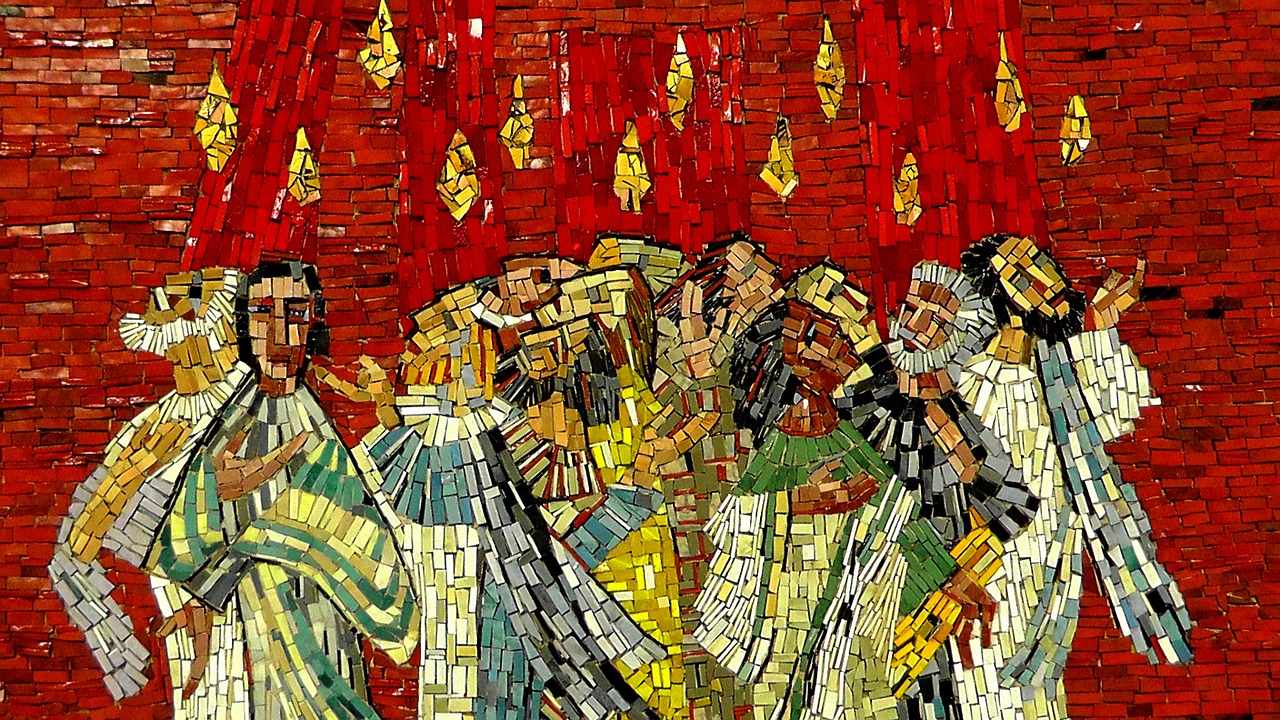 • “
• “